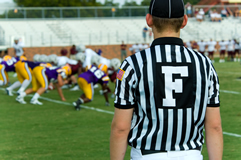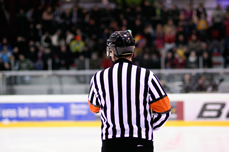
Sports Vision Training consists of the learning and training of Dynamic Visual Skills – that is “Vision in Motion”. These skills include Accommodation and Convergence, Anticipation Timing, Concentration Under Stress, Depth Perception, Eye-Hand Coordination, Peripheral Awareness, Speed and Span of Recognition and Visual Reaction Speed. These are all learned skills that can be improved with practice.
Well-developed dynamic acuity is just as significant as good static acuity. To be effective, a referee/linesman/official/ or umpire requires intense concentration and awareness of what is happening at all times. A slight lapse in either of these areas could result in a missed call or a questionable decision that could ultimately affect the outcome of the game.
The following is a comprehensive breakdown of the dynamic skills and how they more specifically relate to the function performed by officials.

Accommodation is the ability to change focus instantaneously as the play moves closer to, or farther away from you. Convergence is the ability to keep both eyes working in unison so as to achieve good, clear vision, as they track players or a fast moving ball or puck.
The visual system provides you with the information needed in order to act, as well as the information needed to judge when to act. Timing is the key to effective performance. Most efforts fail not because the physical movements were wrong, but because they were made at the wrong time. The ability to anticipate is a major factor in high level performance, and even superior speed, size and reflexes cannot compensate for the insufficient processing of visual information regarding when to perform.
This is defined as the ability to maintain a high level of focus in spite of distractions and/or fatigue and while maintaining total awareness of what is happening all around you. This is not to be confused with staring, which is just another form of distraction. Staring means the eyes are not focused but are in fact disassociated from the action and represents total loss of concentration with little or no sharp awareness of what is going on around you. This phenomenon may show up in the form of Brain Fade. To perform effectively it is necessary to maintain an unwavering focus on every relevant bit of information, i.e. Your position in relation to the action, as well as the discipline not to be distracted and the energy to sustain that total concentration for the duration of the contest.
The ability to accurately judge the movement of the puck as it related to a stationary line and/or moving players is critical in determining goals and offsides.
Physical fatigue can greatly affect concentration, visual reaction time and eye-hand coordination. Eye fatigue can also affect performance levels in much the same way. When the muscles in our eyes feel tired or strained, we feel the fatigue all over. Just like a weight lifting routine is used to increase physical endurance, visual exercises can be used to strengthen the eye muscles, and thereby reduce fatigue.
Enhanced peripheral awareness allows the official to concentrate on a key target, and still be aware of the entire play/action as it develops around them. This in turn, could help to avoid personal injury from unexpected sources, as well as helping them to be aware of interactions that happen away from the puck (i.e.: too many men on the ice, etc)
Since the official must be able to read the entire play at all times, it is essential to take in and interpret many different visual activities at one time.
Visual memory is also very important in order to recall action or events in their continuity when assessing penalties or awarding goals and assists.
How rapidly the official processes the visual information or game action, and initiates a physical response; be it blowing the whistle or waving off a call. An immediate response can often keep a situation from getting out of hand.